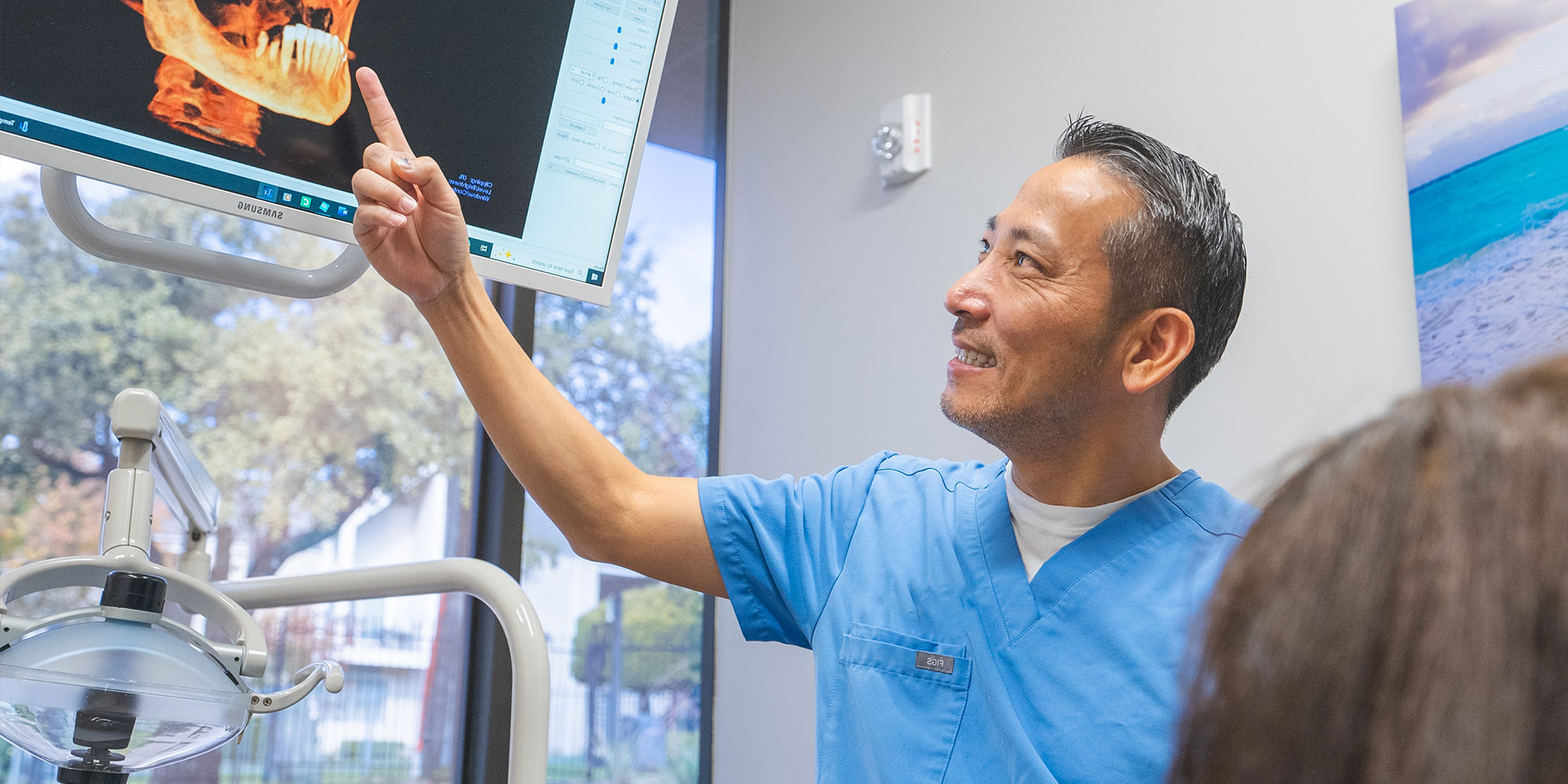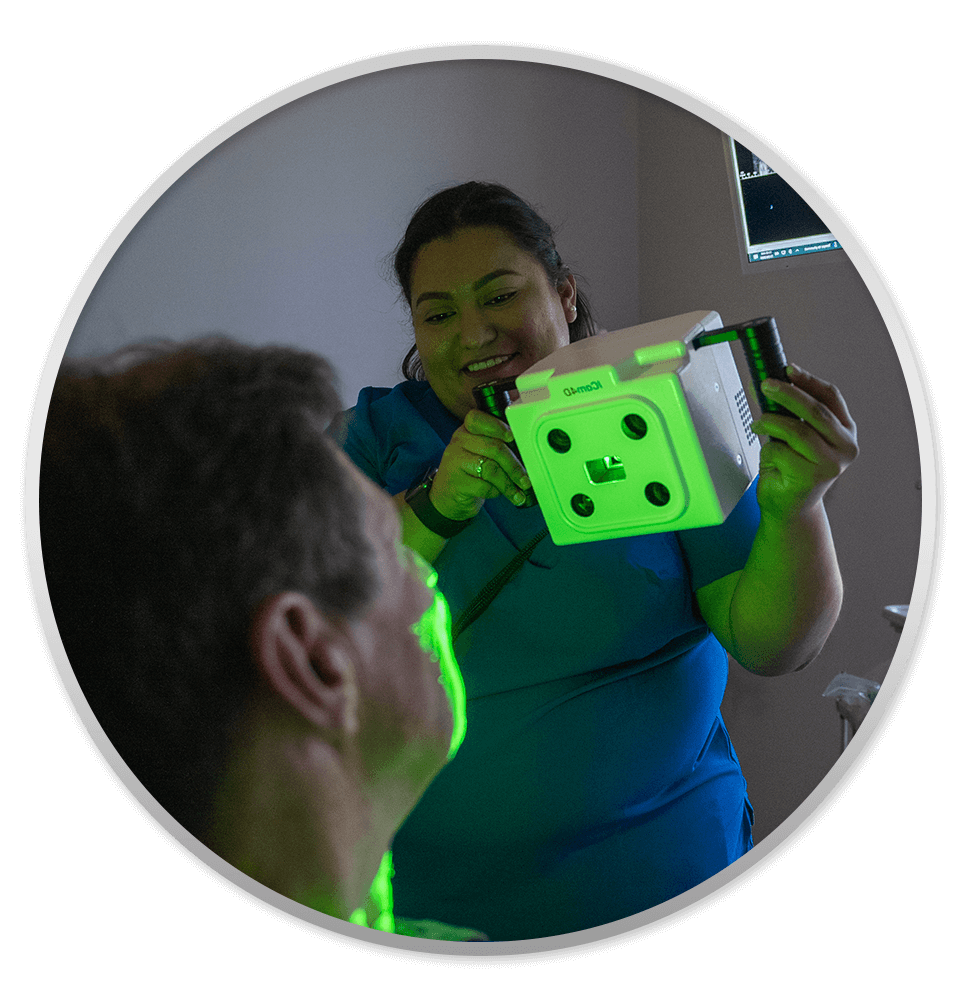
Suppose you’re struggling with discomfort or self-consciousness because of a decayed or missing tooth. In that case, Beyond Dental & Implant Center is here to help with our restorative oral surgery, also known as maxillofacial surgery services. We aim to provide comprehensive solutions that address your concerns and improve your oral health and function.
At our state-of-the-art facility, our experienced dentists prioritize your comfort and safety. Using advanced technology, we perform a range of surgical treatments focusing on minimally invasive and efficient procedures. We aim to help you regain confidence and enjoy a healthy, pain-free life.
We understand that the prospect of oral surgery can bring about nervousness and apprehension, which are entirely normal. However, our team is extensively trained in the latest techniques to make your surgery as minimally invasive as possible.
Your comfort and well-being are our top priorities at Beyond Dental & Implant Center in Dallas, TX. We take additional measures to ensure you feel at ease throughout your appointment. We aim to foster a relaxed and calm environment, enabling you to undergo your procedure with confidence and peace of mind.

Tooth extractions, a routine oral surgery procedure, are performed right in our office. Our team will gently remove the tooth during the tooth extraction procedure, minimizing disturbance to the surrounding bone and gum tissue. With our expertise and precision techniques, we strive to make the tooth extraction process as efficient and comfortable as possible.
Wisdom teeth extraction is a standard procedure to remove one or more of the third molars at the back of your mouth. These teeth often cause pain, infection, or alignment problems because they lack sufficient space to grow properly. An oral surgeon typically performs the extraction under local or general anesthesia, ensuring minimal discomfort. Patients may experience swelling and mild discomfort post-surgery, but recovery generally occurs within a few days to a week.
Bone grafting is a specialized treatment to replenish bone levels in the jaw, often necessary due to ongoing bone loss caused by missing teeth. During the procedure, bone is sourced from the patient or a donor and placed at the site of bone resorption to support dentures or dental implants. Following placement and suturing, the area requires several months to heal and allow integration between the bone grafting material and jawbone.
Dental implants are a permanent solution for replacing missing teeth. They consist of a post, abutment, and restoration. The implant post is surgically placed into the jawbone to provide a sturdy anchor for a new tooth or teeth. Advanced techniques, such as CT-guided technology, ensure precise placement during modern dental implant surgery. Immediate loading of a temporary restoration may be an option for eligible patients, enhancing the efficiency of the treatment process.
A sinus lift is a surgical procedure that adds bone to the upper jaw in the area of the molars and premolars to prepare for dental implants. This procedure is necessary when the natural bone height is insufficient due to bone loss or the proximity of the sinus cavity. During the surgery, the sinus membrane is lifted, and a bone graft is placed to increase the height and width of the jawbone. Recovery typically takes several months, allowing the grafted material to integrate with the existing bone and ensuring a stable foundation for dental implants.
Ridge augmentation corrects deformities or defects in the jawbone’s ridge. It involves adding bone graft material to the area where the bone is deficient, typically due to tooth loss or trauma. This procedure helps to rebuild the bone structure, providing a more stable foundation for dental implants or improving the aesthetics of the jawline. Ridge augmentation is often recommended to enhance the function and appearance of the teeth and surrounding tissues.
Impacted canines refer to teeth that cannot erupt properly into their correct position in the dental arch. This condition commonly affects the upper canines and can result from overcrowding or obstacles blocking their path, such as other teeth or abnormal growths.
Treatment typically involves an orthodontic intervention to guide the impacted canine into its proper place or surgical exposure and bonding to assist its eruption. Addressing impacted canines promptly is crucial to prevent complications like misalignment, damage to neighboring teeth, or cyst formation.
We use gum grafting to treat receding gums, which expose the roots of your teeth, leading to increased sensitivity, decay, and even tooth loss. By taking a small piece of tissue, typically from the root of the mouth, we carefully attach it to the area where the gums have pulled away from the tooth.
Gum grafting not only helps protect your teeth but also improves your smile’s appearance and prevents further gum recession. Gum grafting isn’t just cosmetic—it’s a functional fix with real health benefits.
Wisdom teeth, or third molars, are the final set of teeth to emerge in the mouth, typically appearing between the ages of 17 and 25. While some people may never develop them, for many, these teeth can lead to issues such as crowding, impaction, or infection. In such cases, removal becomes necessary. The extraction procedure can vary in complexity and is typically performed under local anesthesia, IV sedation, or general anesthesia, depending on the patient’s needs and the difficulty of the extraction. Each removal involves three stages: pre-operative preparation, the extraction itself, and post-operative care.
The cost of wisdom teeth removal can vary widely and is influenced by several key factors:
Geographic location: Dental costs often reflect the local cost of living, meaning prices can differ significantly from one region to another.
Procedure complexity: Simple extractions are generally less expensive than those involving impacted or partially erupted teeth.
Number of teeth removed: Extracting all four wisdom teeth in one session will typically cost more than removing just one.
Type of anesthesia used: Local anesthesia is the most affordable, while IV sedation and general anesthesia increase the overall cost.
Provider expertise: The experience and credentials of the dental professional—whether a general dentist or an oral surgeon—can also affect pricing.
In the United States, the average cost for wisdom teeth removal is approximately $1,200, though this figure can fluctuate considerably. Individual procedures may range from a few hundred dollars to over $3,000, especially for complex cases or those requiring sedation.
Insurance coverage for wisdom tooth extraction varies by provider and plan. Some dental insurance plans may cover a substantial portion of the cost, particularly if the removal is deemed medically necessary. Others may offer partial reimbursement or none at all. It’s important to check with your provider to understand what is covered under your policy.
Despite the upfront expense, removing problematic wisdom teeth can result in long-term savings by preventing more serious dental issues in the future. Addressing impaction or crowding early can help avoid complications that might otherwise require costly orthodontic work or emergency care down the line.
Wisdom tooth removal is commonly covered by insurance, though the extent of coverage depends on several factors, including the type of insurance plan and the complexity of the extraction.
Even with insurance, certain restrictions may apply:
To avoid surprises, it’s important to contact your insurance provider in advance and confirm what is covered, what documentation is needed, and whether any out-of-pocket costs may apply.
What Does Wisdom Teeth Removal Cost Without Insurance?
Without insurance, wisdom teeth removal typically costs $250 to $600 per tooth. More complex extractions, especially impacted teeth, can cost more. In addition to the removal fee, sedation or anesthesia can add $100 to $800+, depending on the method used.
Number of teeth removed
Complexity of the procedure
Type of anesthesia
Provider and location
Though the upfront cost can be significant, removing problematic wisdom teeth helps prevent future dental issues like infections or crowding—potentially saving you from more expensive treatments later on.
In Dallas, the cost of wisdom tooth extraction ranges from $250 to $600+ per tooth, but insurance can significantly reduce out-of-pocket expenses. Coverage may come from dental insurance, medical insurance, or a combination of both, depending on the case.
Factors like patient age, severity of the impaction, and type of plan affect how much is covered. Be mindful of limitations such as pre-existing conditions, waiting periods, and annual maximums, which may limit your benefits.
Understanding your insurance details can help you better plan for the procedure and minimize unexpected costs.